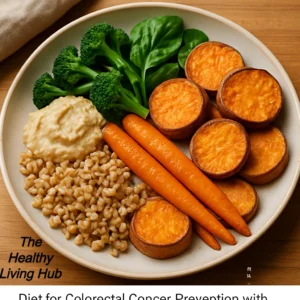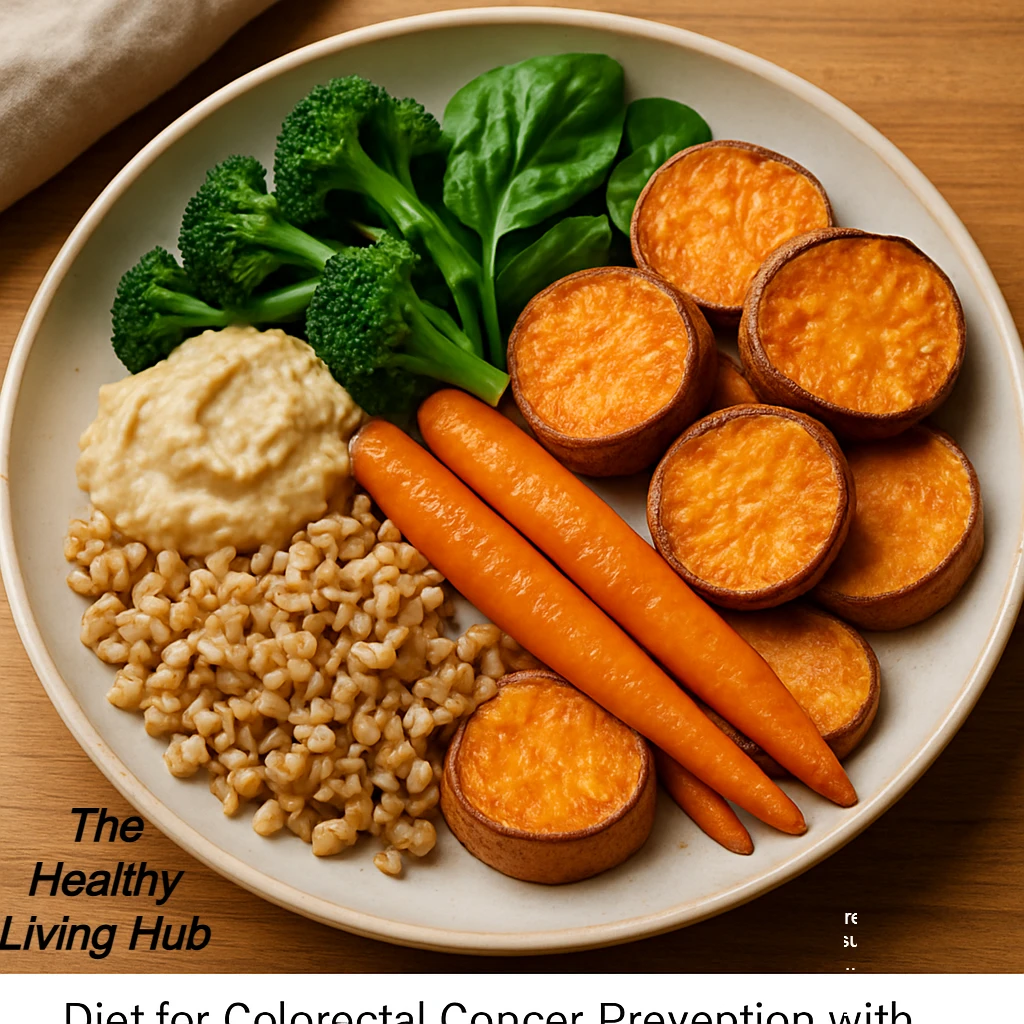Colorectal cancer is one of the most common cancers worldwide, but research shows that what you eat daily can significantly reduce your risk. A diet focused on Diet for Colorectal Cancer Prevention—especially nutrient-rich foods like carrots and sweet potatoes—can lower the likelihood of developing this disease by up to 40%, according to recent findings. These foods are rich in beta-carotenoids and other antioxidants that help protect the colon and support overall digestive health.

Colorectal cancer rates are increasing globally among both older and younger adults. Lifestyle choices, particularly diet, play a major role in this trend. Risk factors include low fiber intake, high consumption of processed foods, and sedentary habits.
The good news is that colorectal cancer typically develops slowly—meaning prevention through regular screening and healthy daily habits can be highly effective.
Carrots & Sweet Potatoes: Beta-Carotenoid Powerhouses
Carrots and sweet potatoes are loaded with beta-carotenoids, natural plant pigments that convert into vitamin A in the body. These compounds act as antioxidants, protecting colon cells from oxidative stress and inflammation.
Large-scale studies show that individuals who consume diets rich in beta-carotenoid–containing foods have up to a 40% lower risk of developing colorectal cancer. This benefit is linked to their ability to neutralize free radicals and support healthy cell function in the colon lining.
The Science Behind Diet and Colon Health
A healthy colon depends on both your gut microbiome and the nutrients you consume. Here’s how a protective diet works:
Antioxidants: Beta-carotenoids and other phytonutrients reduce DNA damage.
Fiber: High-fiber foods feed beneficial gut bacteria and support regular bowel movements.
Reduced Inflammation: Antioxidants calm chronic inflammation that contributes to tumor growth.
Immune Function: A balanced diet strengthens immune defenses, helping detect abnormal cells early.
👉 Read our detailed guide on how fiber supports a healthy gut microbiome for more science-backed insights.
5 Practical Diet Tips for Colorectal Cancer Prevention
1. Eat Beta-Carotenoid–Rich Veggies Daily 🥕
Add carrots, sweet potatoes, pumpkin, and dark leafy greens to your meals 4–5 times a week. Steam, roast, or blend them into soups and smoothies.
2. Boost Your Fiber Intake 🌾
Whole grains, fruits, legumes, and vegetables are excellent fiber sources. Aim for at least 25–30 g per day to support gut health and lower colon cancer risk.
3. Limit Red and Processed Meats 🥩
Processed meats like sausages, bacon, and deli cuts increase cancer risk. Consider swapping them for healthier alternatives—check out our Plant-Based Protein Swap Ideas for easy inspiration.
4. Choose Healthy Fats 🥑
Use olive oil, avocados, nuts, and seeds. These provide anti-inflammatory omega-3s and support colon cell integrity.
5. Stay Hydrated and Active 🚶♀️
Drink enough water and include daily movement like walking or yoga. Both aid digestion and support a healthy colon.
How to Add These Foods to Your Meals
Smoothies: Blend cooked carrots or sweet potatoes with citrus and ginger.
Roasted Veggies: Drizzle with olive oil and herbs.
Soups: Add diced carrots and sweet potatoes for natural sweetness.
Baked Fries: Slice sweet potatoes, toss with olive oil, and bake for a healthier snack.
Making Diet for Colorectal Cancer Prevention part of your daily meals can be both tasty and effortless.
Additional Lifestyle Factors
Regular Screening: Detect and remove polyps early.
Quit Smoking: Tobacco increases colorectal cancer risk.
Limit Alcohol: Excess drinking causes gut inflammation.
Exercise Regularly: At least 30 min a day improves colon health and reduces risk.
Common Myths About Diet and Colon Cancer
❌ Myth 1: “It’s all genetic.”
Fact: While genetics play a role, most cases are linked to lifestyle factors.
❌ Myth 2: “Eating carrots alone will prevent cancer.”
Fact: A balanced, nutrient-dense diet combined with healthy habits offers the best protection.
❌ Myth 3: “Only older adults get colorectal cancer.”
Fact: Rates are rising among younger adults—early prevention is key.
When to See a Doctor
Watch for persistent changes in bowel habits, blood in stool, unexplained weight loss, or fatigue. Most guidelines recommend screening starting at age 45, or earlier if you’re at higher risk.
References & Further Reading
🔗 Related Posts:

